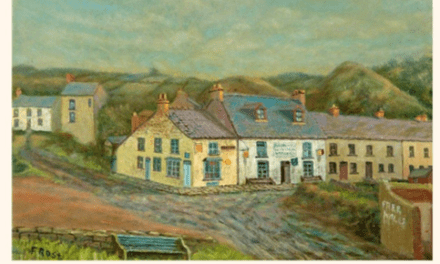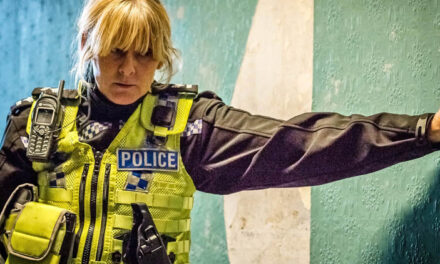Tony Ageh, the BBC’s one original thinker, spoke at Royal Holloway earlier this week. Those expecting a standard defence of the ‘BBC licence fee’ were in for a shock. He proposed a complete rethinking of the concept for the digital age.
“We used to be broadcast beings. We are now internet beings. We should ask what the Licence Fee buys us when we, as citizens, are under attack from all sides. I believe there is, and has always been, a higher calling for the BBC and the Licence Fee.”
He proposes a Digital Public Space which will give all UK citizens the right to free, anonymous and permanent provision of internet bandwidth, giving them access to “our museums and libraries; our public service broadcasters (all of them); our public archives; our government services”. This means getting the internet to everyone, regardless of the cost, including those who are not yet digitally enfranchised. Private companies have been slow in extending broadband to “remoter” areas of the country (much to the fury of farmers who now have to submit all paperwork online). So Ageh’s concept would probably involve engineering a new satellite-based network (already piloted on Exmoor) or other such solution.
He likens the current internet to radio in 1922 when the BBC was founded: a technology whose potential is beginning to be realised, but with a-social and privatising forces in the ascendance. His speech examined that history. When radio was new, it seemed full of dangerous potential. So it was licenced. Showing this licence form from 1903, Ageh demonstrated that the licence fee predates the BBC by almost 20 years

The licence fee is a permit, allowing people to do things. Licences were required to make radios, to broadcast material over the radio, or – in the case of the majority of the population – to receive radio signals from whatever source. Ageh showed how this concept of the permit, still existed in this sinister government commercial from around 1974
The programme being watched is Columbo. Which was broadcast on the commercially funded public service channel ITV.
The deliberately sinister approach suited the times of the three day week and the miners’ strike. But it couldn’t hack it in the 1980s. So a more jovial approach was taken in the famous John Cleese ‘what has the BBC ever done for us?’ commercial
A crucial slippage has taken place here, says Ageh. The licence fee is now defined as all about the BBC, and not all about the whole system of public service broadcasting.
His fundamental point is that “the Licence Fee ensures that the allocated public spectrum is safeguarded and secured and that barriers to entry cannot be placed in the way of the general public by either politicians or commercial gatekeepers.”
Crucial aspects of this public service broadcasting culture have been lost in the commercialised internet. Ageh argues
“Without us really noticing it happen, the internet has started to strip away […] three even more important properties that broadcasting also gave us; three characteristics, so it turns out, that have been fundamental to the vibrant and democratic nature of our media consumption in the past, and that we will sorely miss if they were taken away. These are:
1. Total anonymity – You can watch or listen, secure in the knowledge that nobody can know what you are doing and exploit it for commercial or political ends or to your disadvantage.
2. Unmetered consumption – there was no limit to the amount of broadcasting that you could have or where you chose to access it without additional charge or fees.
3. It cannot be taken away – the confidence to know that you, or other members of your family, will never be cut off from any of the public service broadcasters”.
The concept of the Digital Public Space restores these characteristics to our internet culture. In effect it turns the licence fee proposition upside down. Instead of paying a permit to watch programmes, and getting the technology of broadcasting on the side, this new concept means paying a permit for universal free-at-the-point-of-delivery public sector internet provision with TV programmes thrown in.
Experienced broadcasters in the audience spotted this immediately. “How do we make sure the BBC can continue to make its excellent programmes?” But Ageh is no novice to this game. Ten years ago when he first pitched the idea of BBC i-Player, nobody in broadcasting could ‘get it’. “Why on earth would we want to spend money doing that when people have VHS machines?” It took five years for him to convince them. Now i-Player is what Director General Tony Hall proposes as the future of BBC delivery.
The Digital Public Space is another such concept. It aims to reclaim the internet from its current commercial cacophony and exclusion of the socially marginal. “To get there, perhaps we may need help from the source that created the BBC in the first place – an ambitious desire for there to be an infrastructure constantly developed in the public interest. The combination of Real Thought and Significant Engineering”.
Some of that engineering may already be in place in the public sector. The universities’ JANET networkis already in the public realm and has spare capacity, now being marketed though Jiscom. Church of England leaders, desperate to get someone (anyone) back into their empty buildings, have noticed that many have towers ideal as internet hubs. The government is concerned that its roll-out of digital citizenship (saving millions in admin costs), has stalled in the face of commercial refusal to roll out broadband to ‘uneconomic’ areas with public subsidy.
“There are growing concerns around
- Who does and does not have access to the Internet in the first place;
- The speed, level and cost of access that they have or can afford;
- People’s right to privacy and to retain ownership of their activity, thoughts, comments, and creativity
- Their ability to keep up to date with hardware, software, operating systems;
- The motives of gatekeepers and service providers who stand between the public and the organisations that they wish to access;
- How often each of these will change during their lifetime and the levels of impact on them, their rights and their families”
He argues:
“We are now in a situation where the commercial sector has complete control. And they are dividing up the spoils often making commercial return the only criteria for developing or maintaining our right to access our public services – including but not limited to the public service broadcasters themselves. In many cases obsolescence is built in as the operating model itself. We need to pay them, and to keep on paying, simply to keep pace – eventually we will lose the concept of free-at-the-point-of-use to all public services when they are delivered over IP.”
That’s the danger that Ageh sees ahead, and, if we are to avoid it, we need to go back to the basics of the licence fee and public service broadcasting.
The text of the speech can be found here.
JOHN ELLIS is Professor of Media Arts at Royal Holloway University of London. He leads the ADAPT project on the history of technologies in TV, funded by a €1.6 million grant from the European Research Council. He is the author of Documentary: Witness and Self-revelation (Routledge 2011), TV FAQ (IB Tauris 2007), Seeing Things (IB Tauris 2000) and Visible Fictions (1984). Between 1982 and 1999 he was an independent producer of TV documentaries through Large Door Productions, working for Channel 4 and BBC. He is chair of the British Universities Film & Video Council and also oversees the Royal Holloway team working on EUscreen. His publications can be found HERE.





